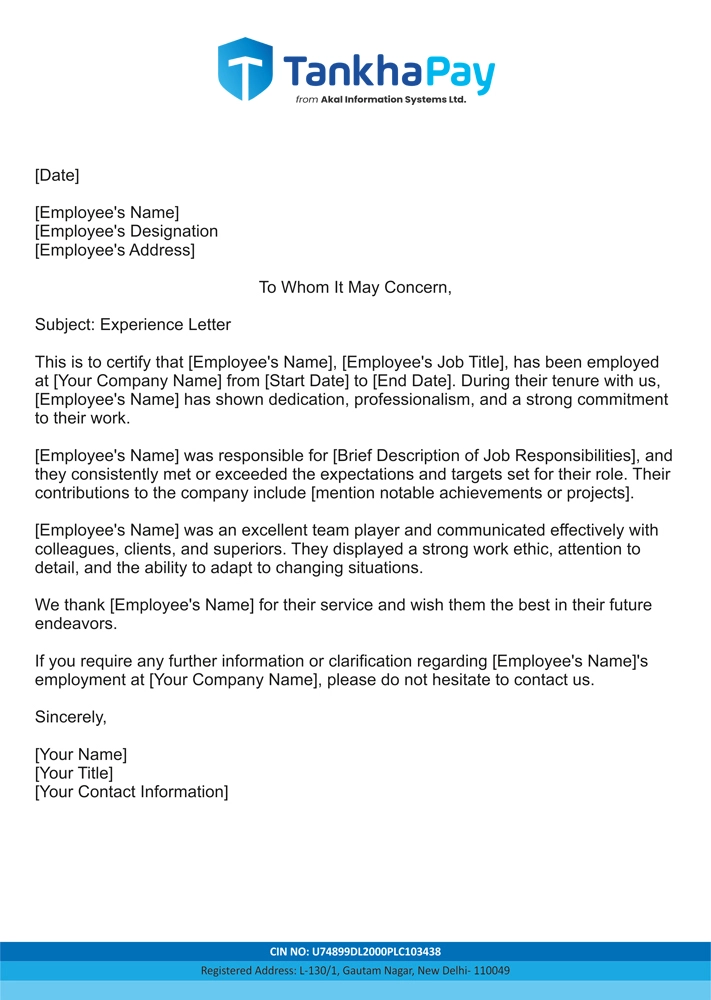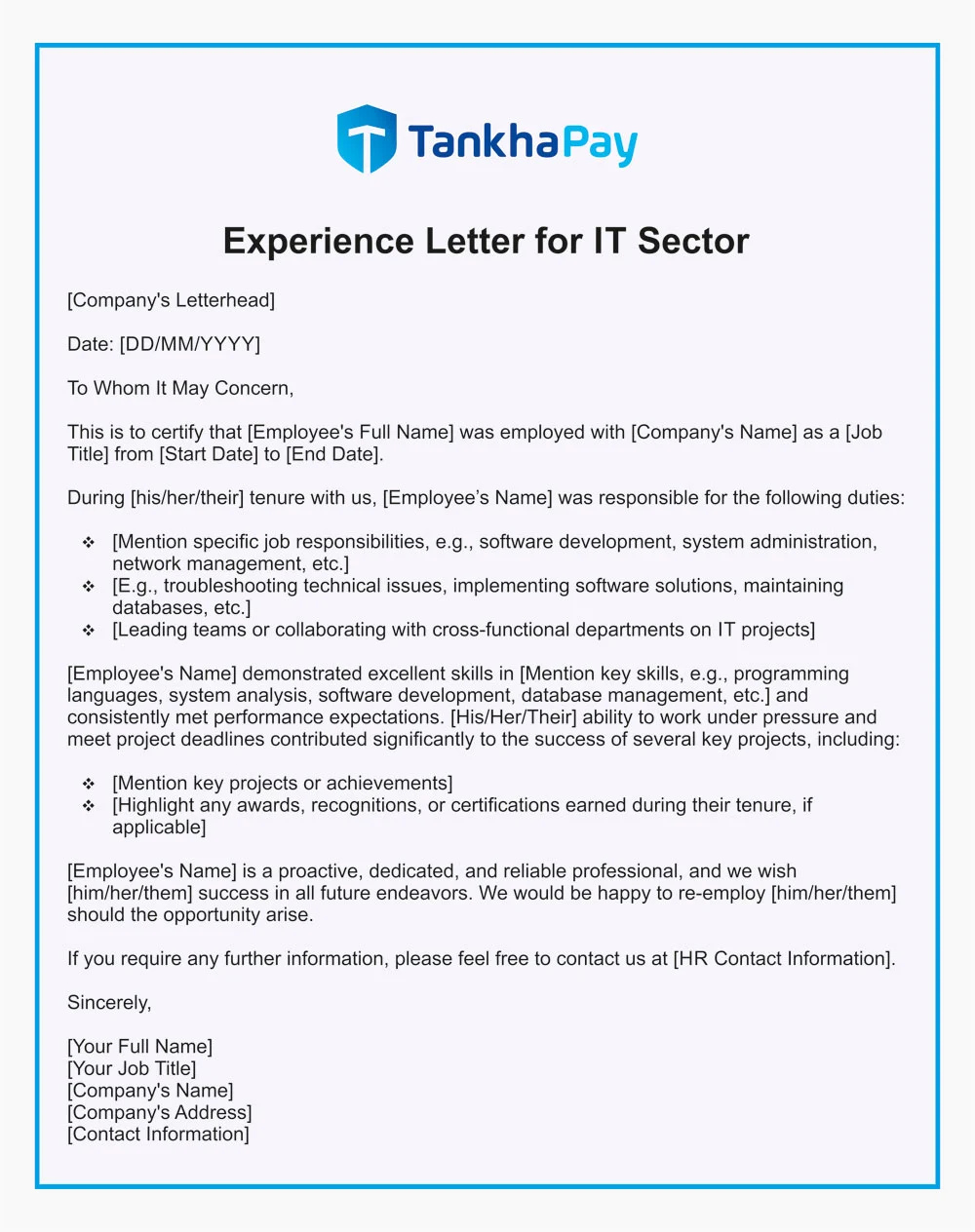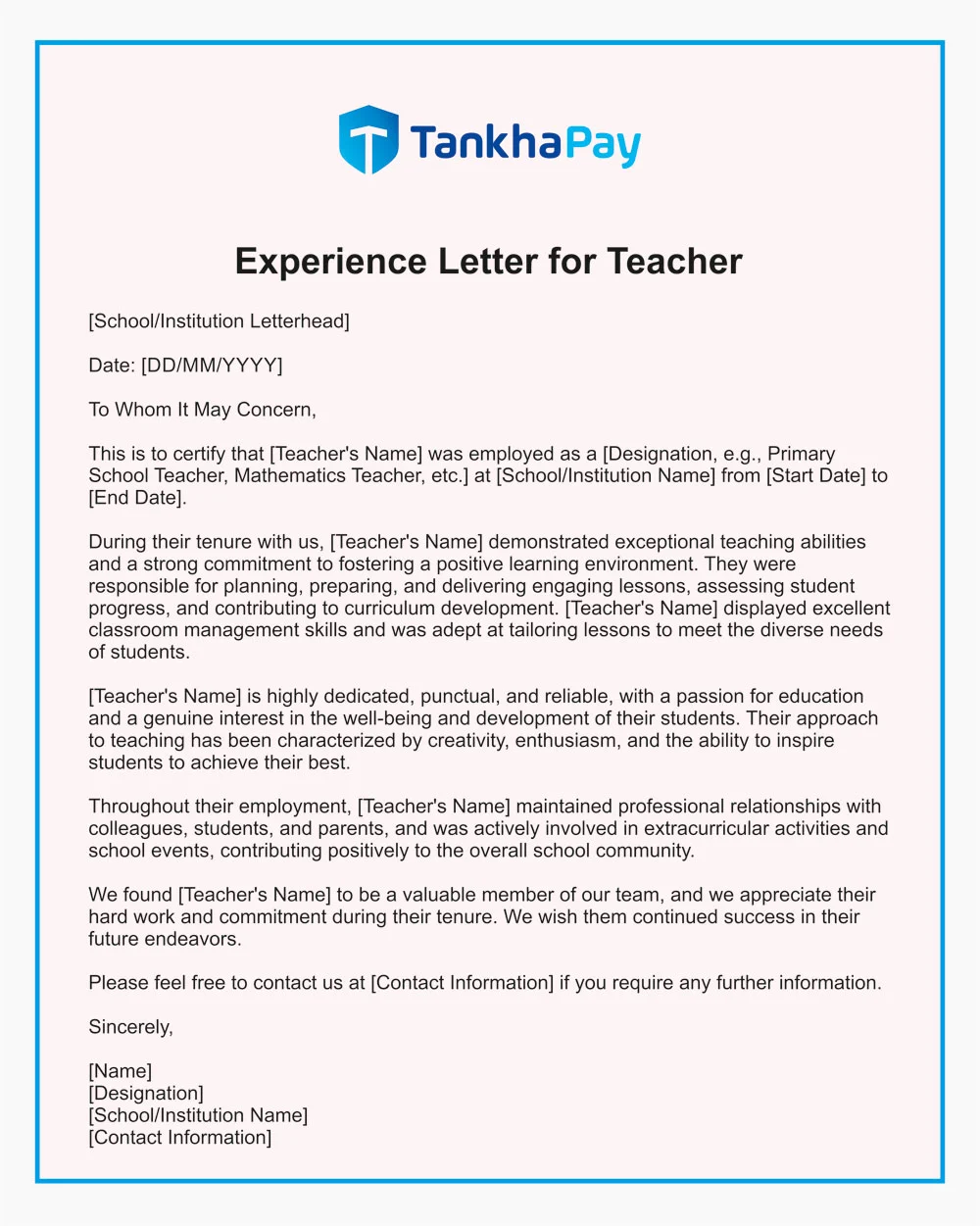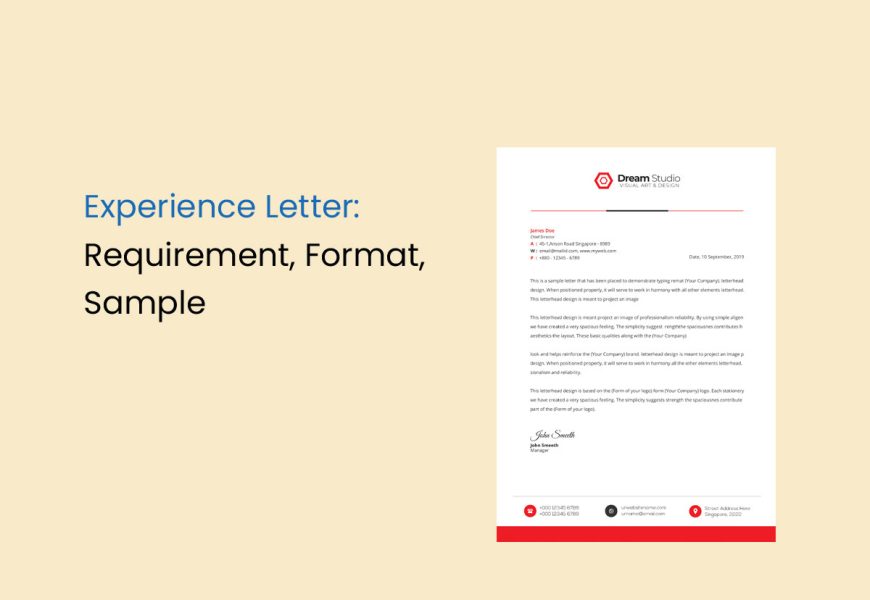An experience letter is an official record the employer provides to employees, confirming their tenure with the organisation. When an employee intends to transition to a new job, the employer must issue this document on their last working day or within 30-45 days, depending on the company’s policy.
This letter is crucial as it verifies the employment period and offers valuable insights from the employer. It typically includes details about the employee’s responsibilities, acquired skills, and the duration of their service.
When changing jobs, employees must furnish this experience letter as proof of their prior work experience. Essentially, it is a formal document issued by the organisation’s head, attesting that the employee has dedicated a specific period to the company to the best of their abilities.
Why is a Work Experience Letter Important?
There are multiple reasons as to why you would need an experience letter. Some of them are listed below:
- Employment Verification
Experience letters are essential for employment verification purposes. They are tangible proof of your work history, detailing your job titles, roles, responsibilities, and tenure with a specific employer. When prospective employers or background check agencies seek to verify your past employment, these documents play a crucial role in establishing your professional background and confirming your claims. - Building Credibility and Trust
Experience letters help build credibility and trust with future employers. Providing well-drafted, authentic letters reassures potential employers that you have a track record of responsible and productive employment. This can be especially valuable in competitive job markets. - Career Advancement
Experience letters can be instrumental in advancing your career. They verify your past roles and highlight your accomplishments and contributions within those roles. When seeking promotions or new job opportunities, a strong track record, as evidenced in these letters, can set you apart from other candidates and improve your chances of career progression. - Immigration and Visa Applications
For individuals pursuing immigration or visa applications, experience letters are often a required component. They provide immigration authorities with a detailed account of your employment history, which is crucial for evaluating your eligibility and the nature of your work experience. These letters can help facilitate the immigration process and support your case. - Academic and Certification Requirements
Many academic institutions and certification programs may request experience letters as part of their admission or accreditation processes. These documents help verify that you meet the prerequisites for a particular academic program or certification, ensuring that you possess the necessary practical experience.
Details Required in Experience Letter
A meticulously crafted experience letter comprises several crucial elements:
- Letterhead of the Employer (Organization): The experience letter should bear the professional identity of your organisation, enhancing its credibility.
- Date of Issue: Clearly state the issuance date in the top right corner of the letter, underlining its timeliness and relevance.
- Employee’s Details: Include the employee’s designation, roles, responsibilities, acquired skills, and tenure. Depending on your organisation’s policies, you might also choose to incorporate the employee’s salary details, although some companies prefer to keep this information separate, often provided through salary slips.
- Evaluation of Employee’s Performance: This section is pivotal, reflecting the quality of the employee’s work. It’s essential to strike a balance, providing constructive feedback without tarnishing the professional relationship. Choosing the right words is crucial in maintaining a positive atmosphere.
- Closing Statement: Conclude the letter positively, expressing confidence in the employee’s abilities. A strong closing statement benefits the recipient and enhances their prospects with potential future employers. Ensure the letter is signed or sealed by the company, adding an official touch to the document.
How to write Experience Letter?
When composing an experience letter for your employees, adhere to these essential steps for an impactful document:
Writing Style and Format
- Utilise Company Letterhead: Initiate the experience letter by placing it on your official company letterhead, showcasing vital information like the company name, logo, and address. This formal setting establishes the authenticity and credibility of the document.
- Maintain Professionalism: From the greeting to the closing statement, uphold a consistently formal tone throughout the letter. Pay meticulous attention to your choice of words, font, and overall format, ensuring a polished and professional presentation. Remember, the language used reflects the ethos of your company, so professionalism is key.
Including Specific Achievements
- Highlight Achievements: Beyond merely listing job responsibilities, emphasise the employee’s notable achievements. Did they lead a successful project? Exceed sales targets? Implement an innovative solution? Including these specifics provides concrete evidence of the employee’s skills and contributions.
- Quantify Achievements: Whenever possible, quantify achievements with numbers or percentages. For instance, mention how the employee boosted sales by a certain percentage or completed a project ahead of schedule. Quantifiable achievements add weight to the letter, making the employee’s impact more tangible.
Tailoring the Letter to Your Needs
- Personalise the Content: Tailor the letter to suit the specific role and responsibilities of the employee. Include details about tasks that are relevant to the job they are seeking or their field of expertise. A personalised experience letter demonstrates that you value and acknowledge the individual contributions of the employee.
- Address Special Skills: If the employee possesses unique skills or qualifications, such as certifications or language proficiency, ensure these are highlighted. Tailoring the letter to encompass these specifics showcases the employee’s versatility and can be particularly valuable if they are pursuing opportunities in a related field.
Proofreading and Editing
- Thorough Proofreading: Before finalising the letter, conduct a comprehensive proofreading. Check for grammatical errors and spelling mistakes, and ensure the content flows smoothly. A well-edited letter reflects your company’s attention to detail and commitment to quality.
- Seek Feedback: If possible, have the letter reviewed by a colleague or supervisor. Fresh eyes can catch errors or provide valuable suggestions for improvement. Constructive feedback can enhance the overall quality of the letter.
Experience Letter Format
In crafting an experience letter, adherence to a formal structure is paramount. Here’s an outline for a professionally structured Experience Letter:
(Positioned at the top left corner)
Date of Issuance
Subject: Experience Letter for (Employee’s Full Name)
To Whom It May Concern,
Designation & Duration of Employment
(Clearly specify the job title and the period of service)
Role & Responsibilities
(Provide a concise overview of the employee’s roles and responsibilities)
Sincerely,
[Employer’s/Owner’s Full Name]
[Designation – Owner/MD/CEO of the Company]
[Signature]
[Company’s Stamp/Seal]

Experience Letter in Different Format
| Formats | Files |
|---|---|
Experience Letter Format in Word |
Download |
Experience Letter Format in Pdf |
Download |
Experience Letter Samples
After reviewing the experience letter’s format, let us look at a samples of the experience letter.
Sample 1. Experience Letter for IT Sector
Ramesh Aggarwal
Software Programer
14, Janakpuri, New Delhi
To Whom It May Concern,
Subject: Work Experience Letter
This is to certify that Ramesh Aggarwal has worked with ABC Infotech as an Software Programer from 02 January, 2022 to 03 March, 2025. During their tenure, Ramesh Aggarwal exhibited exceptional technical skills, problem-solving abilities, and a strong dedication to their work. They were an asset to our IT team, and their contributions played a significant role in the successful completion of various projects.
We wish Ramesh Aggarwal the best in their future career endeavours.
Sincerely,
Mohit Gaur
HR Manager
9874***989

Sample 2. Experience Letter for SEO Executive
Akash Kumar
SEO Executive
30, Faridabad, Haryana
To Whom It May Concern,
Subject: Work Experience Letter
This is to certify that Akash Kumar worked as an SEO Executive at ABC Digital Agency from 01 January, 2023 to 10 June, 2025. Akash Kumar demonstrated exceptional expertise in search engine optimization, significantly improving our online presence and digital marketing efforts. Their analytical skills and dedication contributed significantly to our company’s success in the online space.
We extend our best wishes to Akash Kumar for their future endeavours.
Sincerely,
Suman Singh
HR Manager
8789***676
Sample 3. Experience Letter for Tourism and Hospitality Industry
Riya Sen
receptionist
23, Mussoorie, Uttrakhand
To Whom It May Concern,
Subject: Work Experience Letter
This is to certify that Riya Sen was employed with Sunshine Hotel in the tourism and hospitality sector from 10 July, 2023 to 02 February, 2025. Riya Sen exhibited exceptional customer service skills, attention to detail, and a strong commitment to ensuring guests had a memorable experience. Their dedication and professionalism positively impacted our guests and contributed significantly to our company’s reputation.
We wish Riya Sen continued success in their career.
Sincerely,
Sujesh Rana
Manager
6576***980
Sample 4. Experience Letter for Teacher
Sarita Singh
Teacher
34, Saket, New Delhi
To Whom It May Concern,
Subject: Work Experience Letter
This is to certify that Sarita Singh served as a Teacher at ABC International School from 25 January, 2020 to 05 July, 2025. Sarita Singh demonstrated exceptional teaching abilities, dedication to student learning, and a passion for education. They created a positive and engaging learning environment, fostering the academic and personal growth of their students.
We appreciate Sarita Singh’s contributions to our school community and wish them continued success in their teaching career.
Sincerely,
Savita Aggarwal
Principal
011-456***898

Sample 5. Experience Letter for Financial Analyst
Lokesh Kumar
Financial Analyst
56, Noida, Uttar Pradesh
To Whom It May Concern,
Subject: Work Experience Letter
This is to certify that Lokesh Kumar was employed with us at ABC Finance Ltd. from 4 July, 2022 to 09 September, 2025 in the capacity of a Financial Analyst. During this period, Lokesh Kumar demonstrated exceptional dedication and professionalism in their role.
Responsibilities included:
– Providing financial forecasting and analysis.
– Analyzing financial data and performance.
– Preparing detailed reports on financial status.
– Identifying investment opportunities and evaluating profit plans.
Lokesh Kumar exhibited strong team spirit, a meticulous approach to their tasks, and a steadfast commitment to their responsibilities. They decided to leave ABC Finance Ltd. voluntarily.
We extend our best wishes to Lokesh Kumar for their future endeavours and trust they will continue to excel in their career.
Sincerely,
Sanjay Gaur
HR Manager
856***9875
Sample 6. Experience Letter for Retail Sales
Rakesh Patel
Store Manager
89 Hauzkhas, New Delhi
To Whom It May Concern,
Subject: Work Experience Letter
This is to certify that Ms. Rakesh Patel was employed with us at Abc Kirana Store as a Store Manager from 7 March, 2023 to 06 August, 2025. During this period, Rakesh Patel demonstrated exceptional dedication and competence in their role.
Roles and Responsibilities:
– Screening, interviewing, and hiring staff.
– Managing budgets and maintaining financial records.
– Handling customer complaints and queries.
– Monitoring pricing and stocks.
– Ensuring compliance with health and safety regulations.
– Creating promotional materials and displays.
Rakesh Patel began their journey with us as a sales executive and was promoted within a year due to their outstanding performance and commitment.
We extend our best wishes to Rakesh Patel for their future endeavours and trust they will continue to excel in their career.
Should you require any further information, please do not hesitate to contact us via email or phone during office hours.
Sincerely,
Aditya Mann
HR Manager
7878***999
Do bear in mind that not all organizations follow the same format. While some choose to disclose the Employee’s salary, some opt to leave it and instead attach salary slips. The format also depends on the company culture. Some may be written in a friendly tone, while others in a professional one.
Bonus Tips to write an Experience Letter?
When composing an experience letter for your employees, adhere to these essential steps for an impactful document:
Writing Style and Format
- Utilise Company Letterhead: Initiate the experience letter by placing it on your official company letterhead, showcasing vital information like the company name, logo, and address. This formal setting establishes the authenticity and credibility of the document.
- Maintain Professionalism: From the greeting to the closing statement, uphold a consistently formal tone throughout the letter. Pay meticulous attention to your choice of words, font, and overall format, ensuring a polished and professional presentation. Remember, the language used reflects the ethos of your company, so professionalism is key.
Including Specific Achievements
- Highlight Achievements: Beyond merely listing job responsibilities, emphasise the employee’s notable achievements. Did they lead a successful project? Exceed sales targets? Implement an innovative solution? Including these specifics provides concrete evidence of the employee’s skills and contributions.
- Quantify Achievements: Whenever possible, quantify achievements with numbers or percentages. For instance, mention how the employee boosted sales by a certain percentage or completed a project ahead of schedule. Quantifiable achievements add weight to the letter, making the employee’s impact more tangible.
Tailoring the Letter to Your Needs
- Personalise the Content: Tailor the letter to suit the specific role and responsibilities of the employee. Include details about tasks that are relevant to the job they are seeking or their field of expertise. A personalised experience letter demonstrates that you value and acknowledge the individual contributions of the employee.
- Address Special Skills: If the employee possesses unique skills or qualifications, such as certifications or language proficiency, ensure these are highlighted. Tailoring the letter to encompass these specifics showcases the employee’s versatility and can be particularly valuable if they are pursuing opportunities in a related field.
Proofreading and Editing
- Thorough Proofreading: Before finalising the letter, conduct a comprehensive proofreading. Check for grammatical errors and spelling mistakes, and ensure the content flows smoothly. A well-edited letter reflects your company’s attention to detail and commitment to quality.
- Seek Feedback: If possible, have the letter reviewed by a colleague or supervisor. Fresh eyes can catch errors or provide valuable suggestions for improvement. Constructive feedback can enhance the overall quality of the letter.
Legal Aspects and Compliance
Employers are legally obligated to provide experience certificates, also known as service certificates, to employees upon request, regardless of their employment status.
According to labour laws such as the Kerala Shops and Commercial Establishments Act, 1961 (similar laws exist in other states), specifically 2J(3), employers must issue the service certificate in Form BE within seven days of receiving a request from the employee. This legal provision ensures that employees, even those facing disciplinary actions or absconding issues, have the right to obtain their experience certificates.
Failure to comply with this requirement empowers employees to seek redressal through channels such as the District Labour Officer or the Labour Court. In summary, organizations are bound by law to provide experience certificates to employees, reinforcing the importance of legal compliance in this matter.
Differences Between Experience Letter and Relieving Letter
Relieving letters and experience letters are essential documents in an employee’s professional life, yet they serve distinct purposes in the employment cycle.
Experience Letter
On the other hand, an experience letter can be issued at various points in an employee’s tenure, not just upon resignation. It provides a comprehensive overview of the employee’s work history, including their roles, responsibilities, skills acquired, and duration of employment. Experience letters are valuable for showcasing professional expertise and are often used by employees to enhance their resumes, seek promotions, or apply for further education. Unlike a relieving letter, an experience letter provides a detailed account of the employee’s contributions and achievements during their tenure.
Relieving Letter
A relieving letter is issued when an employee resigns from their position and serves the notice period, confirming the successful completion of their duties. It typically states the employee’s last working day, attests to the fulfilment of contractual obligations, and assures that the employee is relieved from their responsibilities within the organisation. Relieving letters are crucial for employees to join a new job seamlessly, indicating a clean break from the previous employment.
Common Mistakes to avoid while writing a Experience Letter
When crafting an experience letter, it’s crucial to avoid common mistakes that can diminish its effectiveness and impact. Here are a few key pitfalls to steer clear of:
- Inaccurate Information
One of the most significant errors is providing inaccurate details about the employee’s tenure, roles, or achievements. Inaccuracies can lead to confusion and affect the employee’s professional reputation. Employers must ensure that all information included in the letter is precise and truthful to maintain credibility. - Lack of Specificity
Experience letters should be specific and detailed, outlining the employee’s exact roles, responsibilities, and accomplishments. Vague or generic descriptions can dilute the letter’s impact and fail to convey the employee’s unique contributions. Specificity lends authenticity and provides prospective employers with a clear understanding of the employee’s skills and expertise. - Absence of Positive Tone
An experience letter should radiate a positive and appreciative tone. Failing to acknowledge the employee’s contributions, skills, and dedication can create a negative impression. Employers should highlight the employee’s strengths, achievements, and positive attributes, fostering a sense of pride and motivation. A positive tone enhances the letter’s value and showcases the employer’s appreciation for the employee’s efforts.
Explore More Sample Letters
FAQs
Is an experience letter different from a letter of recommendation?
Yes, an experience letter and a recommendation letter differs. An experience letter states the duration of which the employee worked for the company. A recommendation letter, on the other hand, contains statement by the employer stating that they would be willing to recommend the candidate’s skills and abilities to their potential employer.
Is an experience letter with salary mentioned?
Yes, ideally, an experience letter should mention the employee’s salary as it will help potential employers see the candidate’s work performance and payscale.






















